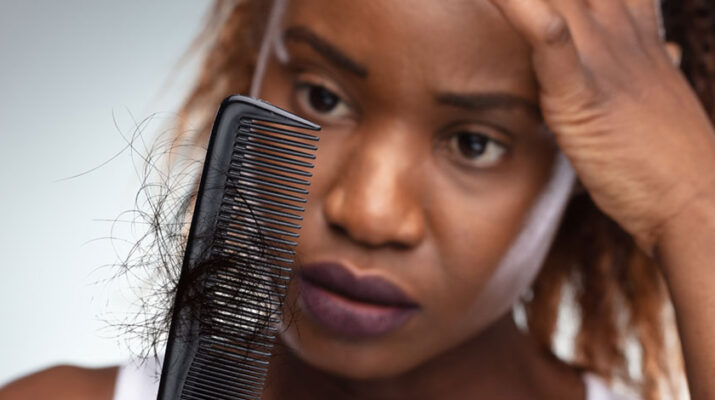Quite a few things good for your whole body are good for your hair
By Deborah Jeanne Sergeant
Unlike male pattern baldness, women’s hair loss can treated successfully in some cases. Unlike the “horseshoe” pattern of baldness affecting men, women tend to experience overall thinning or thinning at the temples, with the exception of alopecia areata, an autoimmune disease, which causes recurring patchy baldness.
Most women experience extreme shedding after pregnancy. Christy Muscato, DONA-certified doula and owner of Beautiful Birth Choices in Rochester, said that is normal.
“During pregnancy, as mammals, we add extra hair,” she said. “It’s a way to stay insulated and warm. And we have so much extra blood supply that it’s a natural occurrence. Once you’re not pregnant, you’re losing that that extra hair you added during pregnancy so it feels like you’re losing tons but you’re just going back to what you were before.”
Hormones also influence hair thickness during perimenopausal, as a reduction in reproductive hormones can mean thinner hair. For either case, she encourages women to eat a healthful diet rich in omega-3 fatty acids, manage stress and maintain a healthful weight.
“Quite a few things good for your whole body are good for your hair,” she said. “Be kind and gentle to yourself.”
Limiting damage to hair can help hair appear fuller. Damage can be caused by heat, chemical treatments such as coloring, perming or straightening, wearing tight braids, buns or ponytails. Use gentle products on the hair and avoid rubbing it or combing it while it is wet.
Marge Pickering-Picone, health and nutrition coach and owner of Professional Nutrition Services of Rochester, Inc. in Webster, looks at clients’ diet regarding hair thinning, including protein intake.
“Some people can’t stand to even look at red meat, but let’s make sure you’re getting a plant-based protein source and enough of it,” she said. “It doesn’t have to be from meat.”
She recommends around 90 grams of protein daily, eaten throughout the day ideally, since the body cannot absorb the entire daily quota all at once.
Pickering-Picone also looks at the individual’s stress level, genetics and other factors. Stressors such as an illness, injury, major weight loss or shocks to the system can cause hair loss, but normally it is temporary.
Dermatologist Mary Gail Mercurio, MD, with University of Rochester Medical Center, said that after the pandemic began, she saw an uptick in women’s hair loss cases because of the stress the pandemic brought.
“It happens two to three months after the trigger,” Mercurio said. “Sometimes people don’t even identify what happened. They have to think back at what changed. They can have complete recovery.”
Stress induced hair loss is usually caused by an interruption of the growth and shedding cycle.
Inflammation on the scalp can also cause hair loss, such as with psoriasis. While that can cause permanent hair loss, patients usually recognize it quickly and can receive treatment to halt its progress.
“If someone who all the women in the family get thinner hair as they age it might be obvious,” Mercurio said. “These conditions are different in cause and different in treatment. A proper diagnosis is the first step in management. See a dermatologist.”

